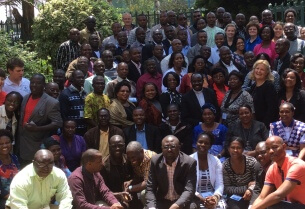The intensely busy year of 2015 was no exception.
“We aim to serve as a connector and catalyst – a convening platform to bring the collective resources and skills of the Communion to bear for the common good,” underlines the Revd Rachel Carnegie, Anglican Alliance Co-Executive Director.
The team of six regional facilitators, all rooted in their local contexts, and four staff at the secretariat, are supported by the Communion-wide Board of Trustees and Advisory Council, which met again in 2015 to guide the Alliance’s strategy.
The Alliance’s key aim in its three pillar areas of work – development, relief and advocacy – is simple but powerful.
Relief
This role became increasing crucial as the number and severity of both extreme natural, climate and conflict-driven humanitarian crises exploded during the past year.
Cyclone Pam in Vanuatu and the Solomon Islands. Earthquake in Nepal. Floods in India and Myanmar. Tropical Storm Erika in the Caribbean. Hurricane Joaquin in the Bahamas. Ebola crisis in West Africa. Terrorist attacks in Pakistan. Ongoing conflict in South Sudan. Political violence in Burundi. War in Syria and Iraq. Migration influx in Europe and the Middle East.
The Alliance has facilitated the Anglican Communion response to the vulnerable people affected by each of these crises in 2015 by sharing prayer requests and information, and helping coordinate support to the local church.
“It has been very important to hear how the churches are responding and to let others in the Communion know how they can support their sisters and brothers through prayer, collaboration and resources,” Rachel comments.
An ongoing priority has been to learn from what happened in order to be better prepared for the future, she adds. “Last year we shared good practice stories in disaster preparedness and response from different areas of the Communion.”
Development
Sharing expertise and building collaboration across the Communion were also at the heart of the Alliance’s work in the area of development in 2015.
One focus was ending human trafficking and modern slavery. “We have developed a shared strategy out of the global consultation in Rome to take this work forward,” Rachel reports.
This included a regional consultation and webinar in Central America and the launch of a network there, as well as working with others in the development of Freedom Sunday, a resource for local churches to raise awareness and take action.
An Africa-wide conference, hosted by CAPA, tapped into local vision and skills in Local Church and Community Mobilisation, celebrating and deepening the churches’ holistic mission.
“This approach to asset-based development, which is self-sustaining, challenges aid dependency and highlights the grassroots and ‘bottom-up’ nature of the Alliance platform,” Rachel comments.
It was also a time for the Alliance team to learn from the experiences and priorities of churches and agencies across the Communion, including the Alliance’s regional consultations – this year in the Pacific, Africa and Europe.
Many other inspirational examples of provincial initiatives are being shared through the Alliance platform, such as the Receivers to Givers initiative in the Philippines, the Refuge Egypt work with refugees, a mission conference in New Zealand, gender justice and youth consultations in Brazil, hydroponics for food security in East Africa, and many other fine models.
Advocacy
The Alliance similarly sought to raise up voices from the Communion and engage both leaders and communities through advocacy in 2015.
“We want to make sure the stories of communities directly affected by climate change, poverty and injustice are heard and shared at the very heart of decision-making,” says the Revd Andy Bowerman, Alliance Co-Executive Director.
To this end Andy cycled to the UN climate summit in Paris along with other pilgrims, carrying with him audio and video messages from fragile coastal communities.
The Alliance also began work to make the Communion more aware of the Sustainable Development Goals launched in September through partnerships such as “Project Everyone”, Andy notes, with the aim of equipping both clergy and laity to know and engage with the SDGs.
What lies ahead in 2016?
Rachel notes that more people than ever before are on the move, with 60 million worldwide fleeing conflict and hunger. Poverty and climate change are among the numerous challenges that are growing, and the demands on local churches to respond to human need are increasing in many parts of the world.
The UN Humanitarian Summit in May 2016 will emphasise the “localisation” of humanitarian responses, which will in turn place more demands on the churches alongside other local institutions. The Alliance will work to connect churches and agencies to help build capacity, Rachel says.
Over this last year the Alliance has learned in greater depth from the Provinces on how it can use its unique role to add value, contributing to the Communion’s response, she adds.
“Coming together, sharing skills and resources, expressing concern and solidarity, building capacity – all enable the Church to be the source of hope and transformation as we are called be within God’s mission.”
***********
The Anglican Alliance family are the churches and agencies around the Communion who gather to connect, share, pray for and support one another to respond to human need, to transform unjust structures, to work for peace and reconciliation and to sustain the life of the earth.
Photo: Over 100 local facilitators working across Africa on catalysing church and community mobilisation (Umoja). The conference in August 2015 was hosted by CAPA, co-convened with the Anglican Alliance with other partners. Credit: Anglican Alliance

